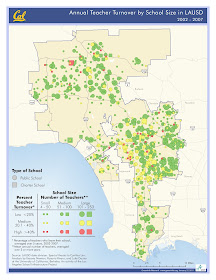In the study, the authors were looking at the statistical factors related to teachers leaving their schools. Teacher longevity at schools is correlated with positive educational outcomes, both among standardized test results as well as family satisfaction, student relationship building, and other "softer" measures of educational quality.
So the study, which was focused only on teachers in the Los Angeles school system, which can differ in many ways from most of the school systems in this country, is written in educational-ese and contains lots of data and statistics and such. I glazed over the statistics analysis and chi squares methodology and such that is part of such academic research, and I have a Masters in Education. But I think this graphic, taken from the report, can express one of the most important conclusions:
Annual Teacher Turnover by School Size in LAUSD 2002 - 2007
Click here to see the map in its original size.
The bottom line of this graphic is that I count 30 schools that have a teacher turnover rate of over 40%, and of that number, all but two are charter schools, which means that 93% of such high turnover schools are charters (and I don't know the exact statistics, but I think charter schools are only about 10% of all the schools in LA). So clearly, teachers are much more likely to leave charter schools than traditional public schools.
The question that the study doesn't address, however, is why. Charter teachers tend to be young; is that why more of them leave? (although more leave charter schools than is average for schools in general). Charter schools tend to be newer, which is also associated with higher turnover, but not at the rates seen in this study among the charter schools. Are the young teachers who work at charter schools more naive and/or idealistic than other young teachers, and thus leave when their fantasies encounter real educational situations? Are the demands of charter schools so intense that teachers can only maintain them for a year or two? Do the (sometimes) for-profit charter schools pay their teachers and/or offer fewer benefits or other incentives that make their staff leave for traditional schools? All of these explanations have been offered, but none have been proven.
So I don't know how to explain this data. But I do have a belief (which is backed up by some data) that students are better served by teachers with more experience and/or commitment to the school in which they teach. Therefore, I think the high teacher turnover rates should be at least a yellow caution light for those who seek to expand rapidly the charter school program (such as the Republican legislators, who this year lifted the 100-school cap on charter schools in North Carolina).

I think experiments of any sort have higher risk of bad flow than "tried and true" ways of doing things. Start-ups have high churn rates, too.
ReplyDeleteAbsolutely. Of course, the charter movement started around 20 years ago, so some of these schools may have been around a while now.
ReplyDeleteStill, my point is that the average turnover at the LA charter schools is three times as high as that at traditional schools. We don't know exactly why that is, but high teacher turnover is not helpful in building educational relationships.
It is just something to consider when we think about charter schools. Lots of people have latched on them as the answer to our problems, but I think we need to point out the potential pitfalls to those schools, including high teacher turnover.
Dynamics of some new systems are so wildly different. I am looking at MOOCs - 2500 students, like 100 of them active the first week, maybe 10 or so in the last week...
ReplyDeleteI wonder what the charter data means. It's definitely interesting.
What charters can provide, educationally, is diversification and disintermediation. At what cost, well. I expect the cost will be high.
The study was looking at demographic factors related to teacher longevity--age of teacher, length of service, size of school, race of teacher, racial composition of student body, etc. It just turned out that the largest predictor of high teacher turnover was being at a charter school. But WHY was not a part of the study.
ReplyDeleteOf course, charter school proponents claim it is because charter schools can get rid of bad teachers (of course, if administrators hired more that 40% bad teachers, that doesn't speak so well of their judgement....but the pro-charter people don't address that).
It is only anecdotal, but most of the ex-charter teachers interviewed in LA in light of the study attributed their leaving to the excessive expectations of teacher workload at charters. Some said the salaries were lower even though the number of hours worked was much higher. They also mentioned that some of the charters were not unionized, which meant such things as only getting year-to-year contracts, reduced benefits, fewer rights in regards to performance issues, etc. Such teachers were originally attracted by the vision, but switched to traditional schools for their own financial self-preservation.